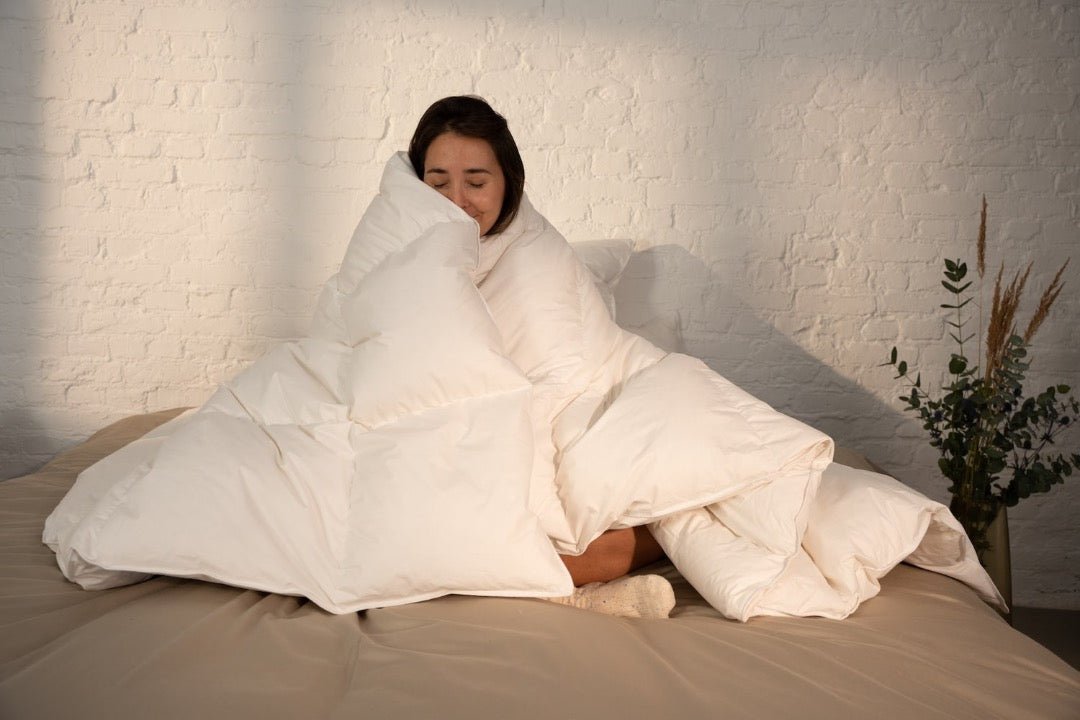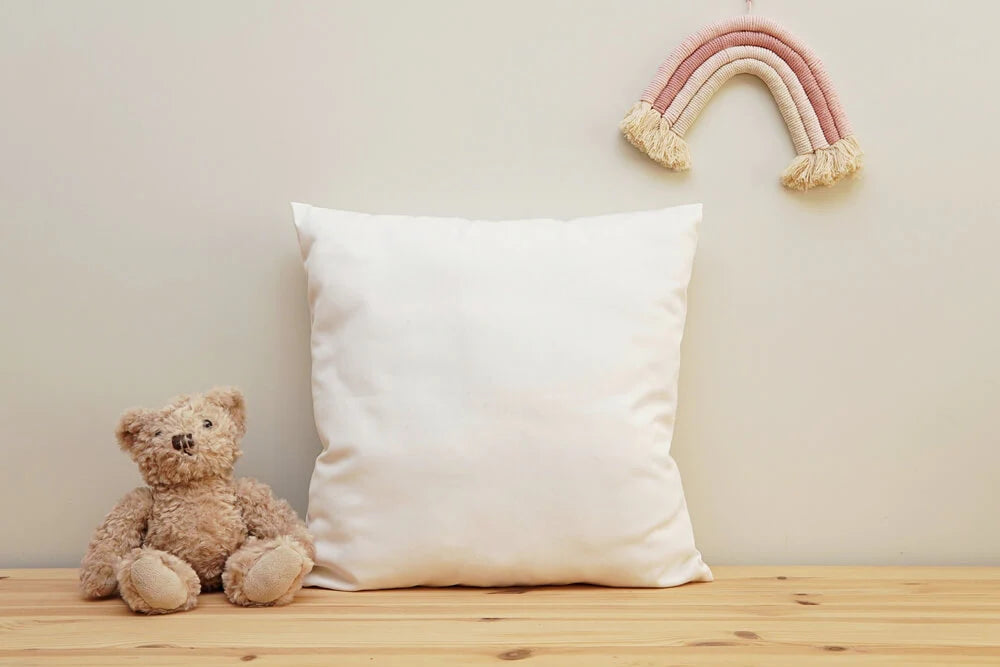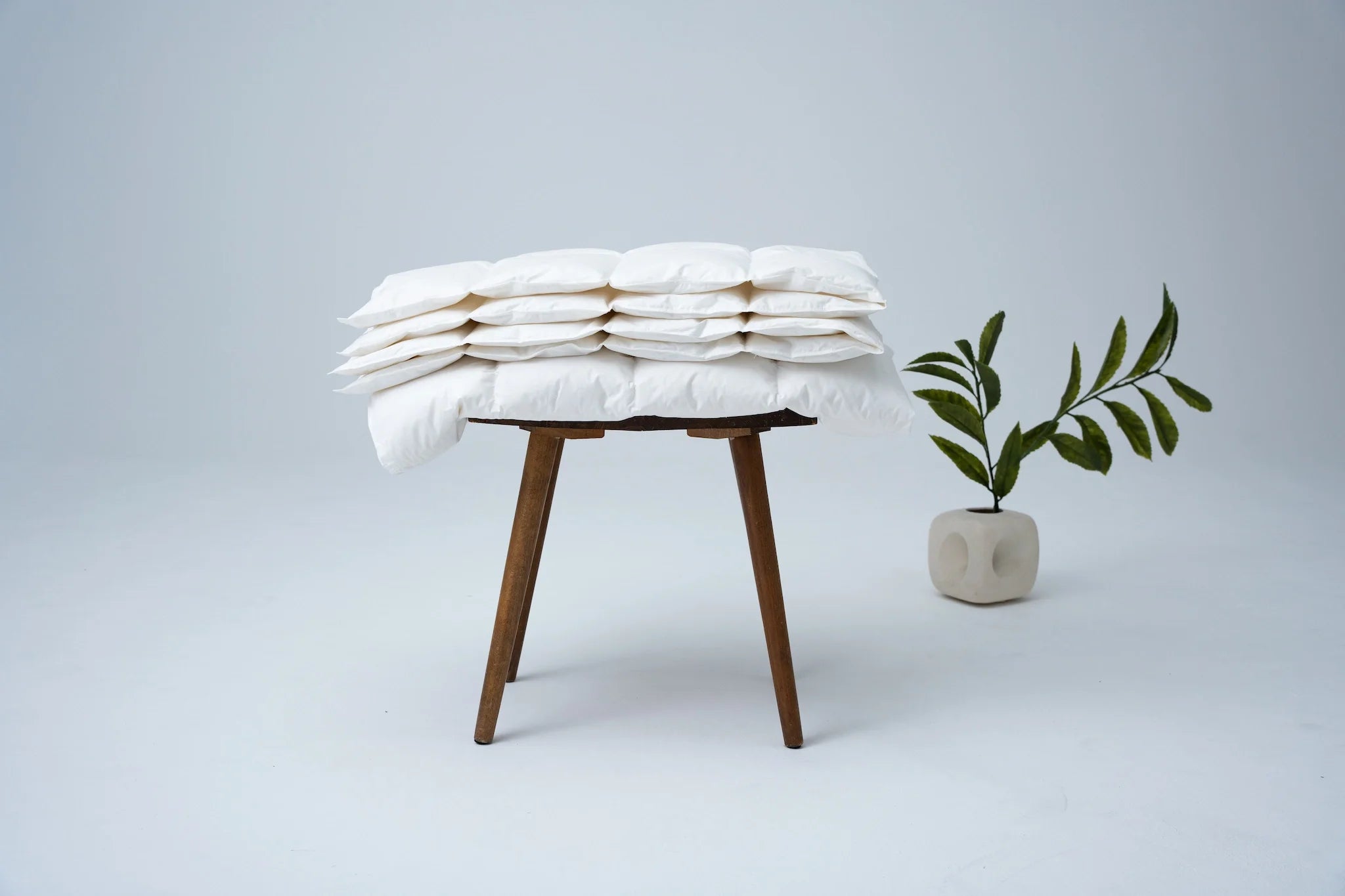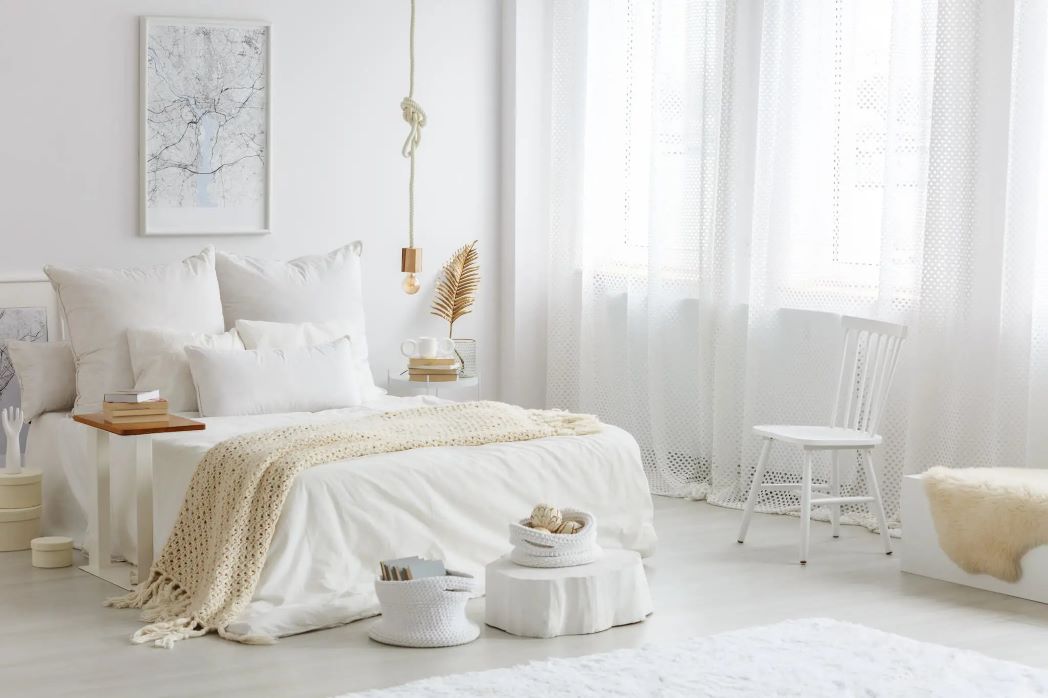Confusion can arise when choosing the perfect comforter , especially when you consider the variety of options available. In this blog post, we answer the ten most frequently asked questions about duvets and give you all the knowledge you need to make an informed choice.
1. What different materials are used for duvets and what are the benefits of each material?
There are a number of materials used for bed covers . These include down , feather , wool , silk and synthetic materials such as polyester. Down and feather offer excellent thermal properties and are very light. Synthetic materials, on the other hand, are often less expensive and hypoallergenic, while silk and wool are valued for their breathability and moisture management.
Down comforters :
Down comforters are cozy, light and breathable. They are particularly suitable for people who get cold easily and value natural materials.
Advantages : Natural product, light, warm, good thermal insulation
Synthetic fiber blankets :
Synthetic fiber blankets are easy to care for, hypoallergenic and inexpensive. They are ideal for allergy sufferers and people who prefer a practical, easy-to-clean blanket.
Advantages : relatively inexpensive, easy to care for, allergy-friendly
Camel hair blankets :
Camel hair blankets regulate temperature and regulate moisture. They are suitable for people looking for an environmentally friendly, natural alternative.
Advantages : good temperature regulation, breathable, durable
Cashmere blankets :
Cashmere blankets are soft, luxurious and warming. They are perfect for people who are looking for a high-quality blanket with an elegant look.
Pros : light, cooling, luxurious
Virgin wool blankets :
Virgin wool blankets are breathable, moisture-repellent and self-cleaning. They are a good choice for people who prefer a natural, long-lasting blanket.
Advantages : breathable, environmentally friendly, pleasant heat development
The optimal duvet depends on your individual needs and preferences. Consider factors like allergies, heat needs, and your budget to find the perfect blanket for restful nights.
2. How do the warmth levels of duvets differ and how do I know which one I need?
Choosing the right level of warmth for your duvet depends on your personal heat needs and the room temperature. There are three levels of warmth: summer blankets , all-season blankets and winter blankets . Summer blankets are ideal for warm summer months, while warm or extra warm blankets are good for cold winter nights.
Choosing the right duvet is crucial for a restful sleep. To find the perfect blanket for your needs, you should consider various factors.
- Heat requirement : The heat requirement depends on your personal feeling and the room temperature. There are summer, winter and all-season blankets that offer different levels of warmth.
- Allergies : For allergy sufferers, we recommend a hypoallergenic duvet with special fillings that keep mites away.
- Personal preferences: Do you prefer natural materials like down or synthetic fillings like microfiber? Both options have their advantages - natural materials are breathable, while synthetic fillings are easier to care for.
To choose the right duvet, consider your heat needs, allergies and personal preferences. By considering these factors, you can find the perfect blanket for restful nights.
3. What sizes of duvets are available and which size is best for my bed?
But how do you find the right size? The appropriate duvet size depends on various factors. With these tips you can make the right choice for a restful sleep.
Know standard sizes:
Standard duvet sizes vary from country to country. In Germany there are the following standard sizes for duvets:
Standard sizes for single blanket: 135x200 cm
Single blanket oversize: 155x220 cm
Double blankets: 200x200 cm and 240 x 220 cm.
Note height:
Your height is crucial when choosing the size of the duvet. A rule of thumb is that the blanket should be at least 20 cm longer than your height.
Consider sleep behavior:
Are you a restless sleeper or do you like to snuggle up? Depending on the situation, a larger or smaller duvet might be more appropriate.
Sharing considerations:
Do you share your bed with someone? In this case, a larger blanket or two separate blankets may be the right choice.
4. What is the difference between a summer and a winter blanket?
The differences between summer and winter blankets mainly lie in the filling material and the degree of warmth. Summer blankets are lightweight and often filled with materials such as silk or lightweight cotton that help regulate body temperature. Winter blankets are thicker, with materials such as down or feathers that provide good thermal insulation.
5. How often should I wash my duvet and what care does it need?
The care of your duvet depends on the material used. Most synthetic blankets can be machine washed, while down and feather blankets can often only be professionally cleaned. It is recommended to wash your duvet every 2-3 years to ensure hygiene.
Here are some tips to extend the life of your duvet:
- Ventilate regularly : Air your duvet daily to reduce moisture and odours. The best way to do this is to hang them out of the window in the morning.
- Use protective covers : A protective cover protects the duvet from dirt and contamination. Change the cover regularly and wash it according to the care instructions.
- Proper Storage: Store the duvet in a cool, dry place to prevent mold growth. Use a breathable protective cover to protect it from dust.
- Professional Cleaning : Have your duvet professionally cleaned every 2-3 years to care for the filling and material.
- Treat stains: Remove stains immediately with a suitable stain remover or take the duvet to the dry cleaner.
With these care tips, your duvet will stay fresh and comfortable for a long time.
6. What allergy-friendly options are there for duvets?
There are special hypoallergenic duvets for allergy sufferers . These are often filled with synthetic materials that are resistant to dust mites. They are also easy to clean, which helps reduce allergens.7. What are the differences between down comforters and synthetic comforters?
The main difference between down and synthetic blankets is the material and properties. Down comforters are lightweight and provide excellent thermal insulation, but they tend to cause allergies. Synthetic blankets, on the other hand, are heavier but provide even warmth and are hypoallergenic.
8. Are there eco-friendly or sustainable options when choosing a duvet?
When choosing a sustainable duvet, you should look for materials that are environmentally friendly and ethically produced . These include organic cotton, bamboo and recycled polyester. Certifications such as the GOTS (Global Organic Textile Standard) or the Fairtrade seal can confirm sustainable production.
9. How should I properly store a duvet when not in use?
Properly storing your comforter can help extend its lifespan. Store them in a breathable bag and avoid damp or very warm areas. If you are not going to use the blanket for a long time, shake it up every now and then to ventilate the filling.
10. What role does the fill level play in down duvets and how can I assess the quality of a duvet?
The filling level of a down duvet refers to the quality and thermal insulation of the duvet. A higher filling level means better thermal insulation. It is often given in Cuin (cubic inches): the higher the number, the better the thermal insulation.
Which blanket is the right choice for me?
A good night's sleep is essential for health and well-being. The right duvet contributes significantly to this. But which duvet is the best choice for you?
Materials and fillings:
There are a variety of materials and fillings for duvets, such as down, synthetic fibers or natural fibers such as cotton. Your personal preferences and allergies play a big role in the decision.
Heat requirements and seasons:
Consider your individual heat needs and the different seasons. Light blankets are suitable for summer, while warmer blankets are preferred in winter.
Care and sustainability:
The ease of care and durability of the duvet are also important factors. Look for washable blankets and sustainable materials.
The right duvet depends on your personal needs. Consider material, warmth needs, care and sustainability to find the perfect blanket for your restful sleep.
Choosing the right duvet can mean the difference between a restless night and a refreshing night's sleep. We hope this guide helps you make the right decision. Sleep well!























Leave a comment
All comments are moderated before being published.
This site is protected by reCAPTCHA and the Google Privacy Policy and Terms of Service apply.